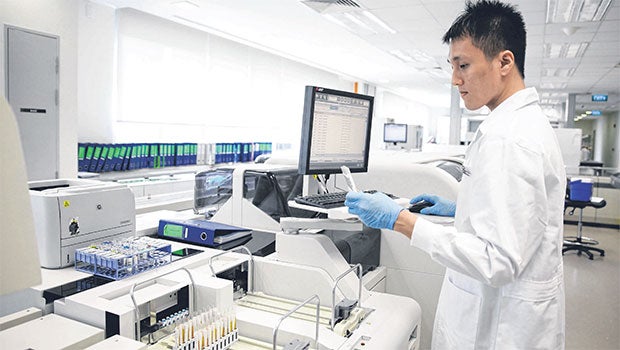
verifying a glucose test result at the Clinical Biochemistry Laboratory under Singapore General Hospital’s Department of Clinical Pathology. PHOTO: GIN TAY FOR THE STRAITS TIMES
Early detection can lead to early treatment, ensure complications are avoided: Doctor
If you feel fatigued or have excessive thirst and urination, it could be a sign that you have diabetes.
More often than not, however, the symptoms may not be obvious – such as weight loss, blurred vision, frequent infections and slow-healing wounds – which is why diabetes is also known as the silent killer.
Hence screenings play an important role in detecting diabetes before it can wreak havoc, said Dr Emily Ho, a senior consultant at Singapore General Hospital's Department of Endocrinology.
“Early detection will allow us to treat the condition early and avoid the complications of diabetes such as long-term damage to the eyes, kidneys, nerves, heart and blood vessels,” she added.
Tests for diabetes are split into those used to screen people for the condition, and those used to monitor existing diabetics.
The fasting plasma glucose test is recommended for population health screening as it is both clinically and cost effective, said the Health Promotion Board.
For diabetics, the random plasma glucose test and the HbA1c can be used to monitor their sugar levels.
If people do not have any symptoms, the diagnosis of diabetes should not be based on a single abnormal glucose reading, said Dr Ho.
At least one additional glucose test result on another day with a value in the diabetic range is needed.
1. Fasting plasma glucose test
This test can measure diabetes and prediabetes – a stage in which blood glucose levels are higher than normal, but which can be reversed through lifestyle changes including healthy eating and exercise.
It is the most common test for diabetes and works by measuring the level of glucose in an individual’s blood after fasting for at least eight hours.
In Singapore, individuals aged 40 and older who are well and do not have a diagnosis of diabetes are recommended to be tested once every three years.
Those aged 18 to 39 who are found to have a higher risk of having diabetes after taking a Diabetes Risk Assessment should also undergo the test.
The fasting plasma glucose test is available at Community Health Assist Scheme (Chas) general practioner (GP) clinics under the Screen for Life programme.
Pioneer Generation cardholders who have not been diagnosed with diabetes can have the health screening and follow-up done at no charge, while Chas cardholders and other Singaporeans can do so at a flat rate of $2 and $5, respectively.
The test results are available at Chas GP clinics within two weeks of the health screening.
2. Oral glucose tolerance test
This test can also check for prediabetes and diabetes.
It involves testing an individual’s plasma glucose level before and two hours after the person has consumed a glucose-rich drink, that is, containing 75g of glucose.
Individuals whose test results are beyond the normal range may also be referred for this test to confirm if they have diabetes.
The test results are available at Chas GP clinics within two weeks of the test.
3. Random plasma glucose test
This test, which is used only to monitor sugar levels in diabetics, measures blood glucose without regard to when the person last ate.
It is not recommended as a screening or diagnostic test for diabetes.
4. HbA1c: glycated haemoglobin
This test is used in the follow-up treatment for diabetes, by measuring glucose levels over the preceding eight to 12 weeks.
While the test is starting to be internationally accepted for the diagnosis of diabetes, it is currently not used as a screening and diagnostic test for diabetes in Singapore.
This is because more verification needs to be done for the test in a multi-ethnic population like Singapore’s, where certain blood disorders that shorten red blood cell life are present in the population.
Contributed by














 Get it on Google Play
Get it on Google Play